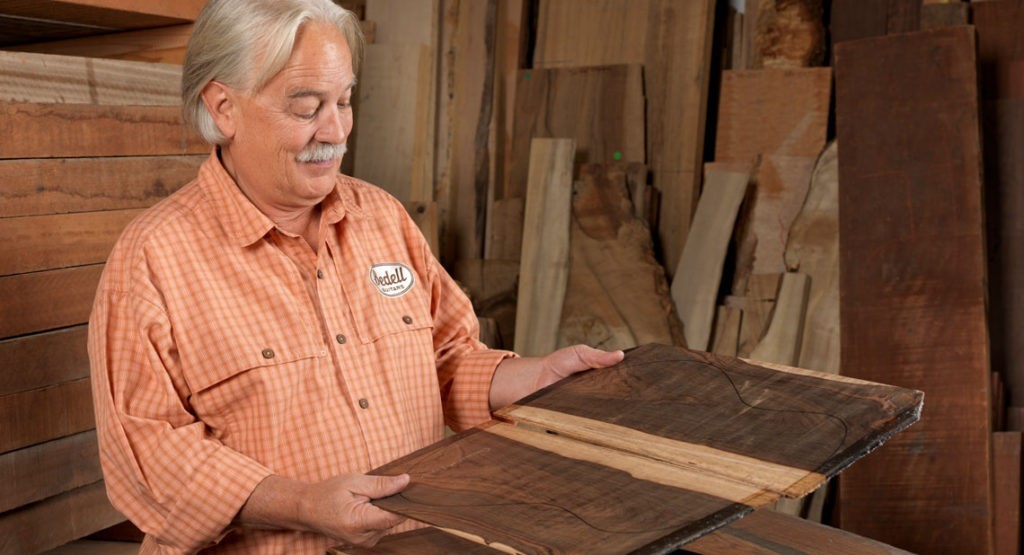Yesterday’s Guitars, Today. Tom Bedell’s Passion for the Sound of the 60’s.

BY MICHAEL ECK
Tom Bedell grew up in an extraordinary time, an era when songs were starting to mean something, when songs were becoming more than just a reason to dance. As a young teenager in the early 60s, Bedell’s ear was caught by Bob Dylan’s “Blowin’ in the Wind” and his spirit was charged by the beautiful harmonies of Peter, Paul and Mary singing Pete Seeger and Lee Hays’ “If I Had a Hammer.”
Bedell, at least to his way of thinking, even then, had something better than a hammer. He had a guitar.
“Most summer afternoons,” he says now, “I would strap my guitar on my back, riding my bike to the local coffee house where friends and I would share chords, craft poetry and feel the aliveness of the world opening up around us.”
He never lost that feeling.
Bedell’s story is burnished legend, a true American tale.
He was obsessed. Soon after hitting the coffee house scene, the Spirit Lake, Iowa native was teaching lessons in the local music store; soon after that he opened his own studio and began importing guitars and marketing them to other retailers throughout the Midwest; then, at the age of sixteen he opened two of his own music shops.
Many success stories could end there, but Bedell’s was just beginning. College called, and so did family, and the guitar world (temporarily) eased into the rearview mirror as Bedell took over his father’s fishing tackle operation. With his strong business acumen and unflagging sense of customer service, Bedell built the latter into an outdoor sports empire and was ready, years later, as his hair turned gray, to become what many might call a gentleman of leisure.
Not!
Bedell, with a laugh, says “I wasn’t very good at retirement.”
In 2009, under the banner of Two Old Hippies (the other being his lovely wife, Molly), Bedell began importing instruments again. But his dream was having his guitars handcrafted in his own workshop in America. In 2010, in Bend, Oregon, Bedell began, finally—the dream realized—designing his own line of USA-made premium guitars, with each model meant to echo the perfect sounds of his youthful memories.
As an entity, as well as a man, Bedell makes yesterday’s guitars today.
“I’m a child of the counterculture,” he beams. “I was part of that. I was part of the anti-war movement. I went to Vietnam as a citizen to see what was happening, and then I applied to be a conscientious objector. Civil Rights, the women’s movement, Earth Day, the sense of responsibility for our planet, all of that is a part of me. Everything that I’ve done in my life has been very much grounded in that way of thinking.”
“When I ran the fishing tackle business, we were the leaders worldwide in aquatic conservation, in how to protect the world’s waterways and fish habitats. I served on councils for the Secretary of the Interior and created organizations that championed environmental protection.”
“We do the same here, sourcing wood responsibly through The Bedell Tonewood Certification Project, using no clear cut timber. In most cases, I know where the wood came from very specifically—what tree, what forest, that local families benefited, where the first millings were … Those values are how we see Bedell Guitars, from ‘Seed to Song.’”
“With Bedell, I have a particular sound that I want to achieve. That’s the sound that I grew up with. When you hear Bob Dylan playing his early songs on an all-mahogany Martin, that’s the sound that’s embedded in my memory.”
“I can hear about five notes on the radio and I go, ‘oh, that’s Bob Dylan.’ Maybe you can do the same thing with Crosby, Stills & Nash, with Joni Mitchell, with Neil Young. There’s just a sound that existed then that we’ve lost in our mass-produced guitars.”
But making Bedell Guitars is not simply an exercise in nostalgia. It’s a recognition of how important that music remains.
“Much of what we hear now is an outgrowth of the music that came along in the 60s and 70s,” Bedell notes. “It’s gone through different iterations and variations, but it’s still the basis for so much that we hear today.”
Each Bedell model acknowledges that simple truth.
“It’s the soul of my mission.”
“The all mahogany Classic Folk series I designed around that Dylan sound. It’s just a beautiful sounding guitar. We put a one and three-quarter inch nut on it, so it would be good for finger style.”
The 1964 series pairs an Adirondack top with Honduran mahogany back and sides.
“I call it the Bluegrass Monster. Mahogany is just so rich, and has such a great midrange, it fits right in with a group of other instruments. In essence, the 1964 is an upgraded version of a D-18 and the Coffee House is an upgraded version of a D-28 with an Adi top and East Indian rosewood back and sides.”
The breakthrough that really set Bedell Guitars apart is Bedell’s acquisition of the world’s only known large collection of legally documented Brazilian rosewood. Tucked away in Spain since the 1960’s, precious Brazilian logs were air dried and aged for decades. When Bedell learned of this treasure he negotiated to acquire the entire collection enabling his team to truly craft the rich powerful acoustic sound of the 1960’s. The Bahia brings back the deep bass Brazilian tone augmented by the shimmer highs that are trademark Brazilian.
Compound tapered dovetail neck joints. Hand voicing. Carefully shaved braces. All solid exotic woods, sanely sourced. Simple, beautiful inlays and bindings. These are the traditions built into each Bedell guitar.
These are instruments that fall into the hand like an old friend; instruments that sound, magically, like your favorite old records.
Bedell Guitars. Yesterday’s guitars today.
